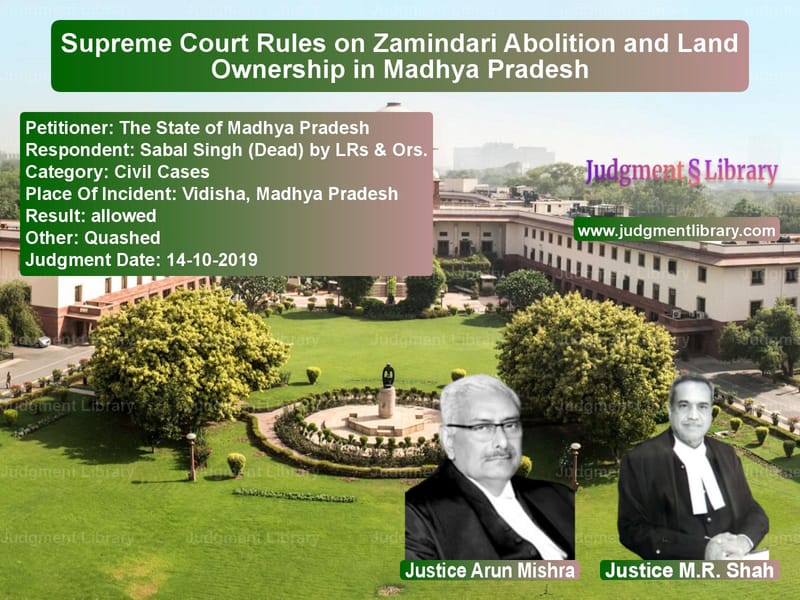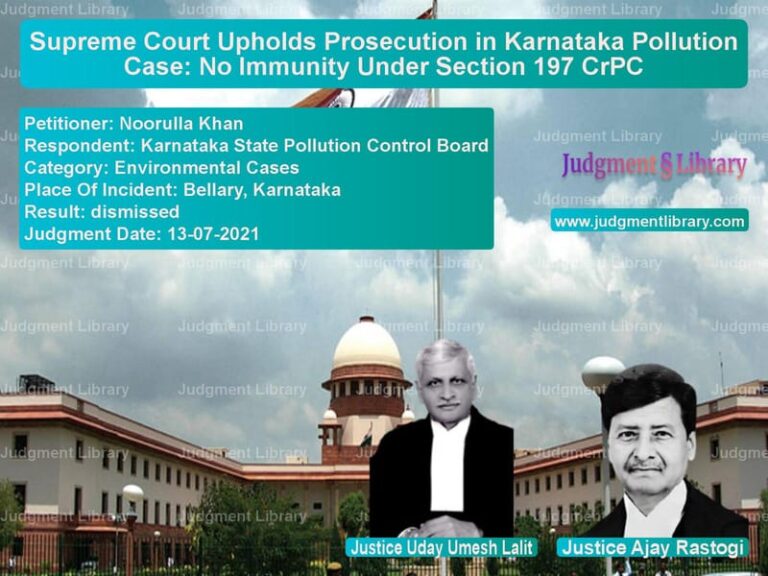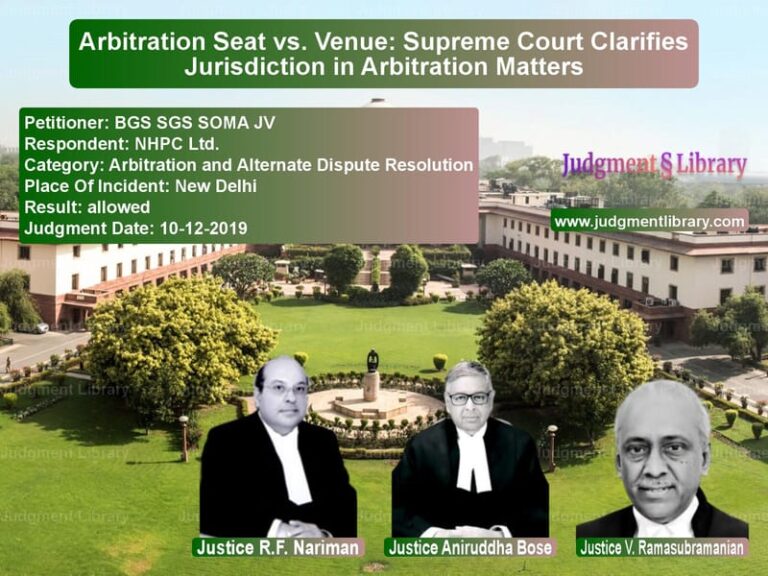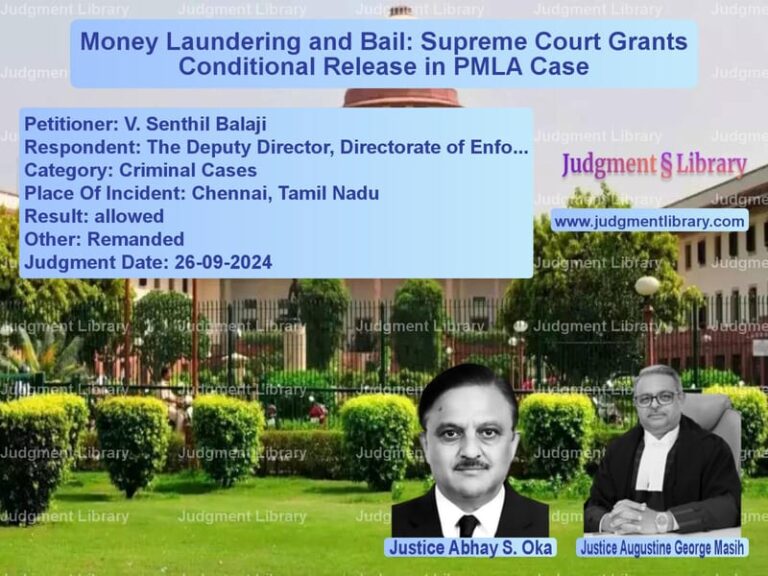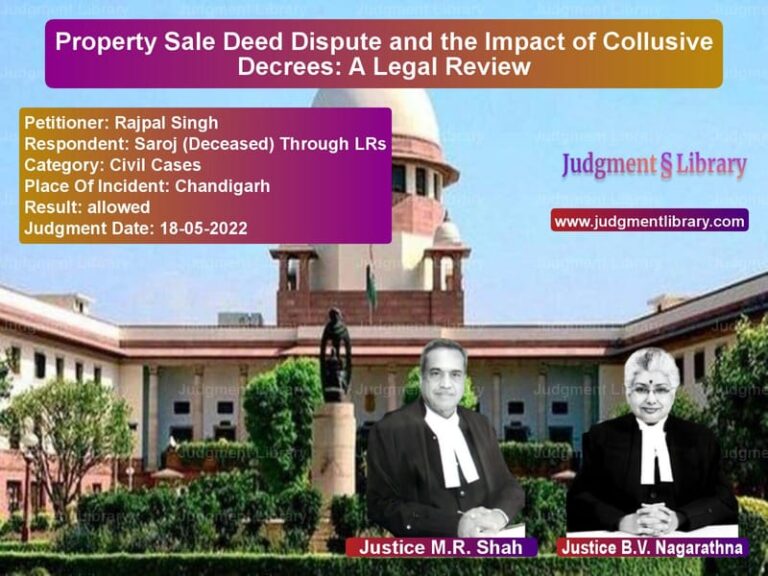Supreme Court Rules on Zamindari Abolition and Land Ownership in Madhya Pradesh
The Supreme Court of India, in The State of Madhya Pradesh v. Sabal Singh (Dead) by LRs & Ors., ruled on a dispute concerning land rights under the Madhya Pradesh Zamindari Abolition Act. The judgment addresses whether land recorded as ‘Grass’ before the date of vesting could be treated as khud-kasht (self-cultivated) land of an ex-zamindar.
Background of the Case
The respondents, as successors of an ex-zamindar, filed a suit seeking recognition of their Bhumiswami (land ownership) rights over land recorded as ‘Grass’ before the abolition of Zamindari. The land in question was located in village Enchada, Tehsil Nateran, District Vidisha, Madhya Pradesh.
They claimed the land was under their personal cultivation and, as per the Madhya Pradesh Land Revenue Code, they had acquired the status of Bhumiswami. However, the State of Madhya Pradesh treated them as encroachers and attempted to dispossess them in 1980.
Arguments by the Petitioner (State of Madhya Pradesh)
The State of Madhya Pradesh contended:
- The land was not khud-kasht and was recorded as ‘Bir’ (grassland) before the Zamindari Abolition Act came into effect.
- As per Section 4(1) of the Zamindari Abolition Act, all proprietary rights, including land classified as cultivable, barren, or grassland, vested in the State.
- The High Court incorrectly reversed the factual findings of the Trial Court and First Appellate Court, both of which had ruled in favor of the State.
Arguments by the Respondents (Sabal Singh & Others)
The respondents, represented through legal counsel, argued:
- Growing grass was an agricultural activity, and the land should be classified as khud-kasht.
- Entries in the Khasra (land records) for Samvat 2007 showed that one of the plots (Survey No. 77) had crops such as ‘Jwar’ cultivated on it.
- The land was under their continuous possession, and the classification as ‘Grass’ should not deprive them of their ownership rights.
- They had acquired Bhumiswami rights under the provisions of the Madhya Pradesh Land Revenue Code, 1959.
Supreme Court’s Observations
A bench comprising Justices Arun Mishra and M.R. Shah made the following key observations:
- Under Section 4(1) of the Zamindari Abolition Act, all land classified as cultivable, barren, or grassland vested in the State.
- Section 4(2) only saved land that was recorded as khud-kasht before the date of vesting, provided it was under personal cultivation.
- The land records for Samvat 2007 showed the land as ‘Bir’ (grassland), and there was no valid entry to classify it as khud-kasht.
- Grassland is naturally grown and does not meet the statutory definition of land under personal cultivation.
- Even if one of the land plots had an entry of ‘Jwar’ in the records, it was in a column not meant for recording cultivation, indicating a possible error or manipulation.
The Court firmly stated:
“Bir land, as per Section 4(1), vests in the State. The grass is naturally grown without effort, and it cannot be said to be produced by way of rendering one’s labor or through employees or hired labor.”
Final Judgment
The Supreme Court issued the following directives:
- The appeal filed by the State of Madhya Pradesh was allowed.
- The judgment of the High Court was set aside, and the decisions of the Trial Court and First Appellate Court were restored.
- The respondents were held to have no ownership rights over the disputed land.
- The land remained vested in the State as per the Zamindari Abolition Act.
Implications of the Judgment
The ruling has significant implications for land classification and ownership rights under the Zamindari Abolition laws:
- Clarification on Khud-Kasht Land: Only land recorded as khud-kasht before the date of vesting and under personal cultivation qualifies for retention by ex-zamindars.
- Strict Interpretation of Land Records: The Court reinforced the presumption of correctness of revenue records unless proven otherwise.
- State’s Control Over Grasslands: Lands classified as ‘Bir’ (grasslands) automatically vest in the government and cannot be claimed by former zamindars.
- Impact on Future Land Disputes: This judgment will serve as a reference for similar cases where ex-zamindars seek Bhumiswami rights over government-vested land.
Conclusion
The Supreme Court’s decision in The State of Madhya Pradesh v. Sabal Singh & Ors. settles a long-standing issue on the classification of khud-kasht land under the Zamindari Abolition Act. By ruling that grasslands vested in the State, the Court has upheld the legal framework designed to eliminate intermediaries in land ownership. This judgment reinforces the need for accurate land records and ensures that land redistribution policies are not undermined by retrospective claims.
Petitioner Name: The State of Madhya Pradesh.Respondent Name: Sabal Singh (Dead) by LRs & Ors..Judgment By: Justice Arun Mishra, Justice M.R. Shah.Place Of Incident: Vidisha, Madhya Pradesh.Judgment Date: 14-10-2019.
Don’t miss out on the full details! Download the complete judgment in PDF format below and gain valuable insights instantly!
Download Judgment: The State of Madhya vs Sabal Singh (Dead) b Supreme Court of India Judgment Dated 14-10-2019.pdf
Direct Downlaod Judgment: Direct downlaod this Judgment
See all petitions in Property Disputes
See all petitions in Landlord-Tenant Disputes
See all petitions in Succession and Wills
See all petitions in Judgment by Arun Mishra
See all petitions in Judgment by Mukeshkumar Rasikbhai Shah
See all petitions in allowed
See all petitions in Quashed
See all petitions in supreme court of India judgments October 2019
See all petitions in 2019 judgments
See all posts in Civil Cases Category
See all allowed petitions in Civil Cases Category
See all Dismissed petitions in Civil Cases Category
See all partially allowed petitions in Civil Cases Category

